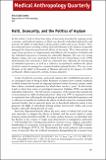Haiti, insecurity, and the politics of asylum
Author(s)
James, Erica C.
DownloadJames_Haiti insecurity.pdf (148.1Kb)
PUBLISHER_POLICY
Publisher Policy
Article is made available in accordance with the publisher's policy and may be subject to US copyright law. Please refer to the publisher's site for terms of use.
Terms of use
Metadata
Show full item recordAbstract
In this article, I seek to show how states of insecurity provoked by ongoing social, economic, and political ruptures in Haiti can disorder individual subjectivity and generate the flight of individuals seeking asylum within and across borders. Nongovernmental actors working in Haiti and with Haitians in the diaspora frequently managed the long-term psychosocial effects of insecurity. Their interventions can range from repressive to compassionate and influence the formation of identity and the embodied experiences of trauma for vulnerable Haitians. The case of a young Haitian refugee who was repatriated to Haiti from the United States in the 1990s demonstrates how insecurity is both an existential state reflecting the disordering of embodied experience, as well as a collective sociopolitical condition the effects of which cannot be managed or contained within national borders. The case is emblematic of the plight of thousands of Haitians affected by the January 12, 2010, earthquake.[Haiti, insecurity, asylum, trauma, disaster]
Date issued
2011-09Department
Massachusetts Institute of Technology. Program in History, Anthropology, and Science, Technology, and SocietyJournal
Medical Anthropology Quarterly
Publisher
Wiley Blackwell
Citation
James, Erica C. "Haiti, Insecurity, and the Politics of Asylum." Medical Anthropology Quarterly 25.3 (2011): 357-376. Copyright 2011 American Anthropological Association.
Version: Final published version
ISSN
0745-5194